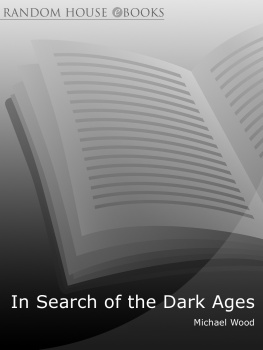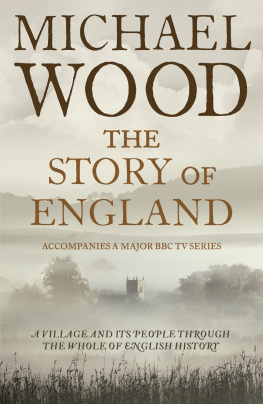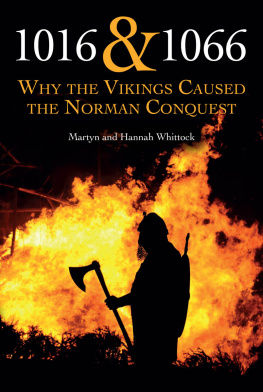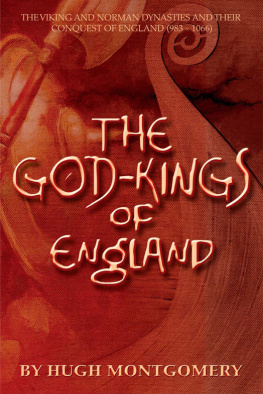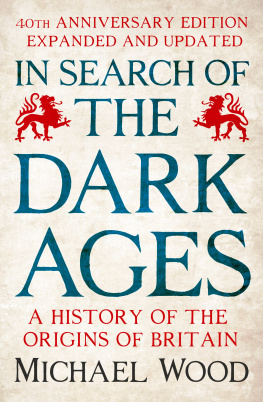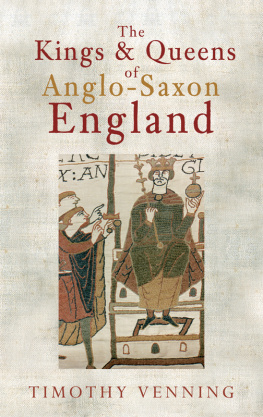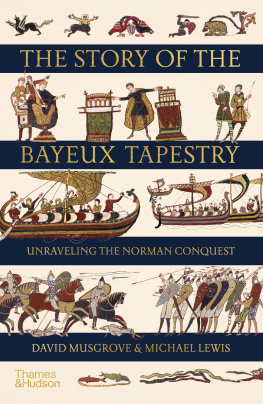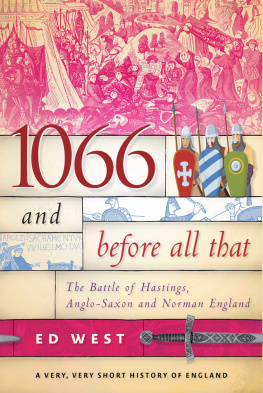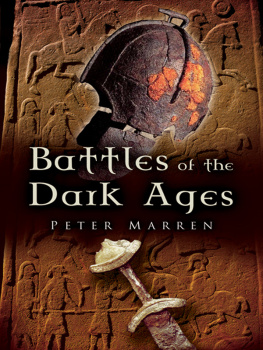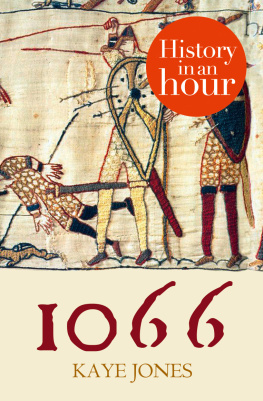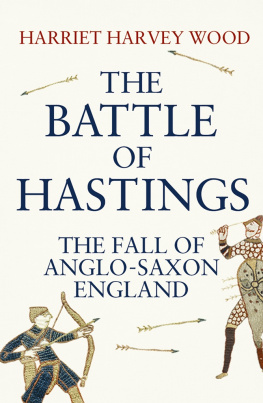CONTENTS
CHAPTER ONE
Boadicea
CHAPTER TWO
King Arthur
CHAPTER THREE
The Sutton Hoo Man
CHAPTER FOUR
Offa
CHAPTER FIVE
Alfred the Great
CHAPTER SIX
Athelstan
CHAPTER SEVEN
Eric Bloodaxe
CHAPTER EIGHT
Ethelred the Unready
CHAPTER NINE
William the Conqueror
About the Book
This edition of Michael Woods groundbreaking first book explores the fascinating and mysterious centuries between the Romans and the Norman Conquest of 1066. In Search of the Dark Ages vividly conjures up some of the most famous names in British history, such as Queen Boadicea, leader of a terrible war of resistance against the Romans, and King Arthur, the once and future king, for whose riddle Wood proposes a new and surprising solution. Here too, warts and all, are the Saxon, Viking and Norman kings who laid the political foundations of England Offa of Mercia, Alfred the Great, Athelstan, and William the Conqueror, whose victory at Hastings in 1066 marked the end of Anglo-Saxon England.
Reflecting recent historical, textual and archaeological research, this revised edition of Michael Woods classic book overturns preconceptions of the Dark Ages as a shadowy and brutal era, showing them to be a richly exciting and formative period in the history of Britain.
About the Author
Michael Wood is a distinguished broadcaster and film-maker, and the author of several highly praised books on English history, including The Domesday Quest and In Search of Shakespeare. He was educated at Manchester Grammar School and Oriel College, Oxford, where he did post-graduate research in Anglo-Saxon history. He is a fellow of the Royal Historical Society.
For my mother and father
INTRODUCTION
THE MODERN BRITISH ARE A NATION OF IMMIGRANTS . This book spans a period of a thousand years of their history. Its framework is the gradual transformation of mainland Britain under the impact of various invading peoples. The original inhabitants, the Celtic-speaking Britons (ancestors of todays Welsh), were overcome by the Romans after AD 43. There was initial, bitter resistance, culminating in the savage revolt of Boudica in 6061, but for over three centuries Britain was a relatively prosperous province of the Roman Empire.
Between AD 400 and 500, the period traditionally known as the Fall of the Roman Empire, the Romano-British society in lowland Britain which had lasted over 300 years was invaded and partially conquered by Anglo-Saxon immigrants who came from Denmark and Saxony. These fifth-century invasions form the background of the period to which later traditions assign the wars of King Arthur in which he defended British society against the invading English. (Today we often use the terms British and English indiscriminately, but, historically, the British were the original islanders and the English the Anglo-Saxon newcomers, and this distinction is used throughout this book.)
In the ninth and tenth centuries Britain was swept by new waves of invaders from Scandinavia the Vikings. They came for plunder, but most of all for land to settle and farm. At this time a number of Anglo-Saxon kingdoms flourished in what was to become known as England. Most were destroyed by the invaders. The careers of the three greatest Anglo-Saxon kings, Offa (75796), Alfred the Great (87199) and Athelstan (92439) were all touched by the Vikings to Offa they were a shadow on the horizon; to Alfred they were enemies in a life and death struggle; Athelstan was their conqueror and assimilator. The course of the Viking invasions left Wessex the chief power in Britain, and by 939 England existed in roughly the same geographic terms as it does today. But in the eastern and northern parts of England the 7 Vikings had settled permanently, irrevocably changing the character of the society. The heavy settlement of a Scandinavian free peasantry and warrior class in the Midlands and East Anglia meant that the Anglo-Saxon kings had to be an effective power there to outface Viking kings from overseas. At first the English succeeded, for example procuring the downfall of Eric Bloodaxe, the last king of an independent Viking Northumbria in 954. But failure to maintain this influence by Ethelred the Unready (9781016) led to the fall of the English monarchy and a generation of Danish rule under Canute and his successors. Although the line of Alfred was restored in 1042 in the person of Edward the Confessor, the royal house had lost its vigour. When Edward died childless in January 1066, a powerful earl with no great claim to the throne, Harold Godwinson, became king, only to fall in battle at Hastings the same year fighting one of his rivals, Duke William of Normandy, the Conqueror. The Norman Conquest signifies the end of Anglo-Saxon England, though the English people still speak an Anglo-Saxon language, and their social and political organisation has its roots in the society founded in this island by Germanic invaders 1500 years ago.
As might be expected, the sources for such a long period are not only diverse but variable in quantity and quality. We can divide them into three main categories: narrative history (chronicles, annals, histories), documentary records (laws, charters, wills, writs, Domesday Book), and material sources (coinage, metalwork, sculpture, manuscripts, embroideries, etc). In the last category we might also include the whole range of archaeological evidence. Other kinds of sources appear in these pages, particularly literary compositions poems, letters, saints lives, royal biographies but it is perhaps the chronicles and charters which require a brief explanation.
Chronicles are year-by-year notes recording important events accessions, battles, deaths, and so on. They are not shaped works which interpret history in the manner of the classical historians. They were perhaps originally jottings set down by monks in calendars and tables used to calculate the date of Easter. At first they might be as simple as Day dark as night (Annals of Wales AD 447); gradually they give more detail: In this year Aldfrith king of Northumbria passed away on 14 December at Driffield (Anglo-Saxon Chronicle AD 705).
In 731 the first great work of English historical writing was published by a monk called Bede at the monastery of Jarrow in Northumbria. The Ecclesiastical History of the English People transformed the bare framework of annals into a true historical synthesis with vision and style. Bedes work was to remain the framework for much that followed for instance, he was the first to use dating by the Incarnation AD for historical purposes, and his book became the international best seller of the early Middle Ages. Bedes sources were mainly oral, though he had access to documents from some of the English churches, notably in Kent.
The classical tradition of historical writing was still known. For example, although Tacitus works were not rediscovered until the Renaissance, Suetonius biographies of the Roman emperors were very influential; they gave barbarian kings an idea of what a ruler should be, and they were also a model for a shaped work of history with a message which could serve the interests of a royal dynasty. These ideas grew stronger after the reign of Charlemagne in Francia (modern France) from 768 to 814, the epoch we now call Carolingian after him. Charlemagnes forceful and glamorous kingship was an ideal for later kings like Alfred the Great. Accordingly a work like the Anglo-Saxon Chronicle, though based on earlier West-Saxon monastic annals, becomes expansive in the Frankish style in the reign of Alfred in a way which suggests that it was compiled under Alfreds personal supervision in order to advertise the success of his own dynasty. Copies of the chronicle (handwritten of course) were then disseminated to churches throughout England, and it survives in several somewhat different versions. (Generally I have not distinguished between them in my text.)
Next page
